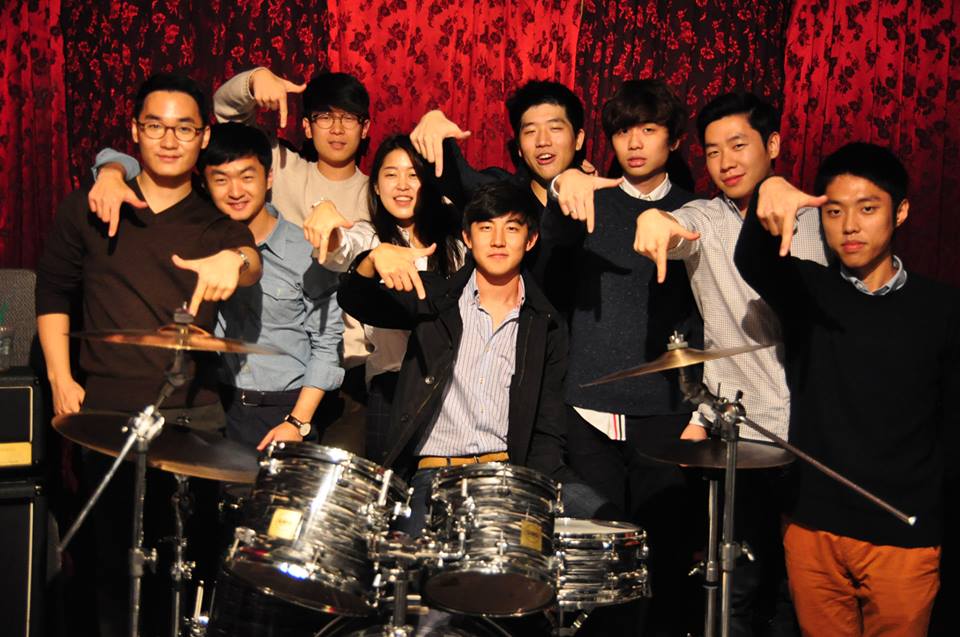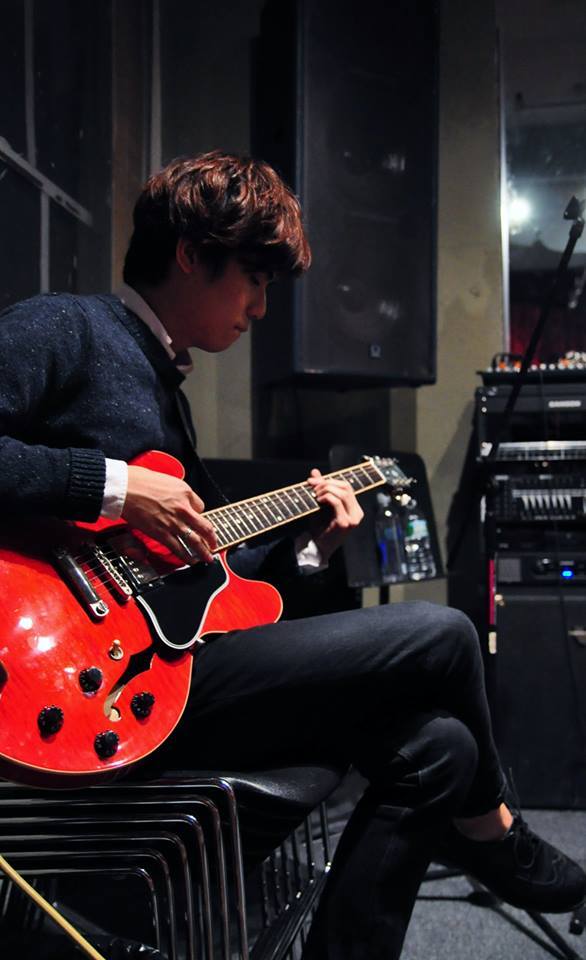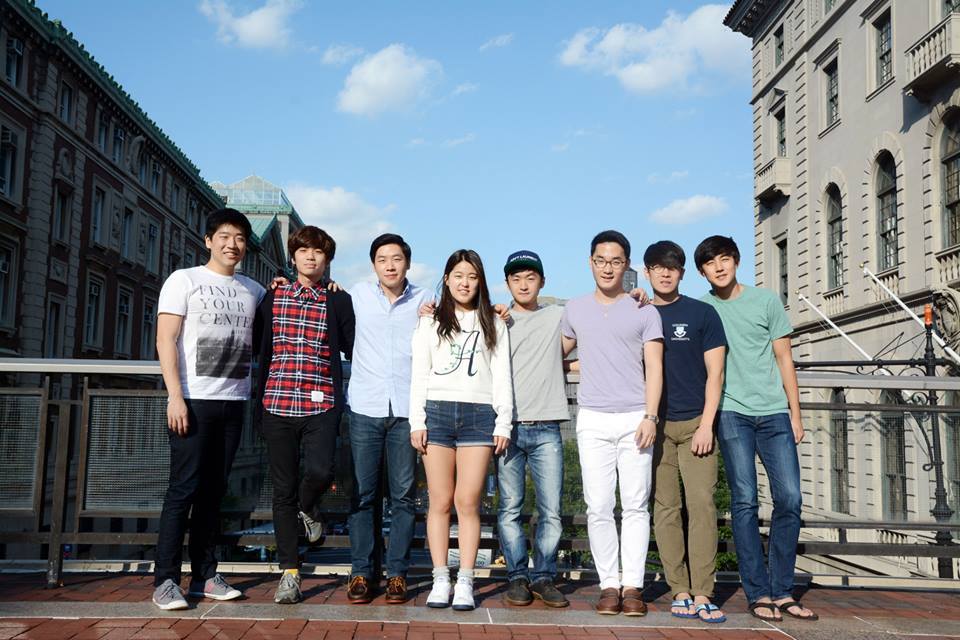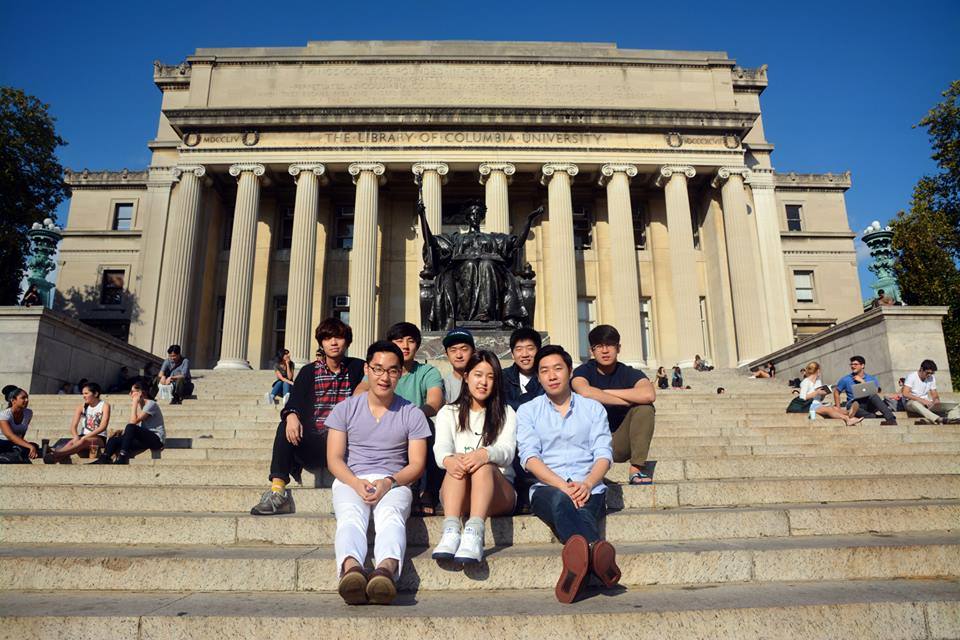- California Assembly OKs highest minimum wage in nation
- S. Korea unveils first graphic cigarette warnings
- US joins with South Korea, Japan in bid to deter North Korea
- LPGA golfer Chun In-gee finally back in action
- S. Korea won’t be top seed in final World Cup qualification round
- US men’s soccer misses 2nd straight Olympics
- US back on track in qualifying with 4-0 win over Guatemala
- High-intensity workout injuries spawn cottage industry
- CDC expands range of Zika mosquitoes into parts of Northeast
- Who knew? ‘The Walking Dead’ is helping families connect
Columbia University’s ‘Talent Complex’ unites Korean students through music

From left, Edward Soo-min Han (Keyboard), David Dong-jin Kim (Guitar), Andrew Sunghwan Kim (Vocal), Ashley JungAh Chung (Vocal), Marvin Won-bin So (Drum), Paul Jin-wang Yoo (Vocal), Philip Hyung-ho Shin (Guitar), Gerry Hyung-joo Nam (Bass), Alex Yeon-sung Jung (Director, Manager) (Courtesy of Yeon-sung Jung)
By Brian Han
Among the 30 percent of “Asian/Asian Americans” that are a part of Columbia University’s undergraduate student body, there is a unique Korean sub-community named Talent Complex, also known as 개성공단 (geh-sung-gong-dahn) in Korean.
At first glance, the group looks like your run-of-the-mill college rock band, but underneath the surface there’s a philosophy that makes the project so much more than the sum of its parts.
For most Koreans, 개성공단 would refer to the Kaesong Industrial Complex — an industrial region on the Korean peninsula that is supposed to act as a symbol of cooperation between the South and North.
To the musicians involved, the name is not meant to hold any political undertones and instead is a loose metaphor.
“We just want to become a band that could bring people together,” explains manager and student Jung Yeon-sung, 22. “We hope that our music can heal people, especially students in New York who are often stressed out.”
Talent Complex functions more like an artist collective rather than a band. It’s a creative safe haven for the students of Columbia to explore any Korean musical interests ranging anywhere from contemporary K-pop to trot, which is Korea’s oldest form of pop music.
Even though it was founded only a year ago, the members had a much grander vision.
“We are in the process of developing a brand called Talent Complex,” guitarist Philip Hyung-ho Shin said. “We hope that under the name of ‘Talent Complex’, other younger Columbian students in the future will be able to freely pursue their interest in Korean music. One day, a high school student might be applying to Columbia University hoping to become part of Talent Complex.”
He explains that there are other university organizations in place that make the formation of such a group more accessible.
“The Korean community has changed a lot recently after the foundation of KISAC [Korean International Students Association at Columbia],” according to Shin. “We’re finally building a sense of community across all grades and majors. We still have a long way to go, but it is going in the right direction at a rapid pace.”
In essence, Shin and the other seven current members will only be a part of the group as long as they are still enrolled as students.
“By selecting members from different age groups, Talent Complex is able to survive, even when current members graduate,” says Jung. “With our current system, the band can be passed down to younger generations of students and with it the name Talent Complex is able to continue on.”
Considering that the band is comprised only of undergraduate students, it may be a surprise that the ages range from 20 to 26. Part of this is due to South Korea’s conscription (mandatory military service) law for males.
“During my two years of service in the [South Korean] army, I watched K-pop music show programs every single day,” says vocalist Andrew Sung-hwan Kim, 24. “I think K-pop was the sole comfort in my military service.”
“I taught myself how to play the guitar during the two-year stint in the Korean army and can play acoustic and electric guitar,” says David Dong-jin Kim, 22. “I listen to 10cm, Busker Busker, Kim Kwang-seok, and Damien Rice, mostly Korean indie-folk rock.”
Aside from the age diversity, six of the members were born in Seoul, South Korea. Drummer Marvin Won-bin So, 25, and vocalist/band leader Paul Jin-wang Woo, 26, were born in New Jersey and South Carolina, respectively.
At the moment, these student musicians strictly play covers rather than original songs, but the resulting product distinguishes itself due to the wide array of tastes and backgrounds present in the band.
“I listen to rap songs from Korean rappers, classical music and songs from jazz artists like Chet Baker,” says Keyboardist Edward Soo-min Heo, 24. “This background, combined with American pop songs and jazz provide much room for creativity in our song covers.”
“I listen to folk songs, British rock, K-pop and hip-hop,” says bassist Gerry Hyung-joo Nam, 24. “[I played in a] high school rock band. One friend back in middle school was a bassist and I went to a practice and got to [play] his bass. I fell in love with the deep and low sound.”
“I do not have any experience performing with a band prior to Talent Complex, though I was in a choir in high school and I’ve always enjoyed singing,” says vocalist Ashley Jung-ah Chang, 20.
Even though most of the members are engineering, finance or math majors, they still put a great amount of care into the project.
“We take our music very seriously,” Shin said. “For practice, we jam in midtown once a week for three to four hours. We already had two performances during the fall semester including one solo concert that hosted over 150 people.”
As for whether Talent Complex acts as a source of pride or identity, it was clear that the answer was simpler than that.
“We do feel proud playing in the band, but it’s not necessarily because it is an all-Korean band,” he explains. “We got together to simply play songs we love, not to find our identity through playing Korean music. Nationality [is important] for us, but we don’t want to magnify the meaning too much. We just love Korean music.”
Visit Talent Complex on Facebook for upcoming shows, music and videos.



















Lisa
December 11, 2014 at 2:18 PM
If you aren’t Korean, but have an interest in korean culture/music, can you join Talent Complex?
Pingback: Columbia University Complex Systems | locate - university reviews
Pingback: Dong Meng Columbia University | info - masters degree info